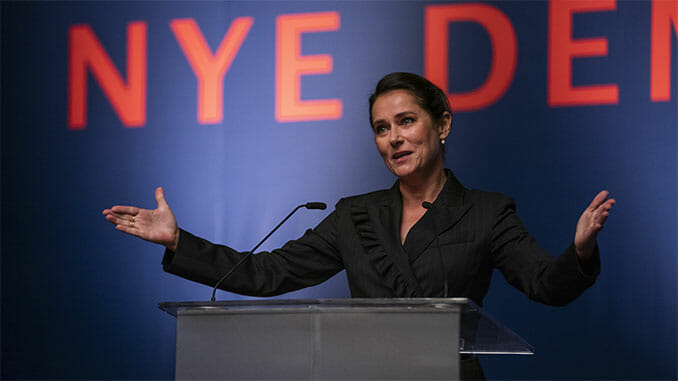Amid Revival Fatigue, Borgen: Power & Glory Reminds Us That Sometimes It Pays to Revisit Old Favorites
Photo Courtesy of Netflix
Revivals are no longer a novel concept in Hollywood. But while the excitement with which these projects are now met might no longer be as deafening as it once was, one thing remains just as true today as it did years ago, when the phenomenon first took root in a creative ecosystem that was a little less starved for originality but still obsessed with nostalgia: A series must have something new to say to warrant its return. Otherwise, it risks being little more than a shallow cash grab made by a greedy corporation looking to capitalize on built-in audiences. Luckily for Borgen—the Danish political drama from Adam Price that, along with The Killing and The Bridge, helped to redefine the global television landscape in the early 2010s—it still has plenty of intrigue and a lot to say about women and power.
The series, which is back for a new, self-contained season on Netflix after originally signing off the air in 2013, follows Birgitte Nyborg (Sidse Babett Knudsen), a minor centrist politician who becomes the first female prime minister of Denmark. The first two seasons cover the character’s unlikely rise to power and the subsequent cost of holding onto that power while facing frequent attacks from not just the left and right, but also from her own cabinet and the unrelenting press. The third season, which picks up two-and-a-half years after the end of the second, details Birgitte’s return to politics, which sees her challenge the Moderate leader for power, lose that challenge, and then form a new political party in response.
What sets Borgen apart from most other political dramas on TV is not the show’s setting in Europe or the structure and rules of the Danish government (which I still don’t fully understand even after 38 episodes). It is the show’s investigation of its heroine’s approach to her career and her home life, which results in a series that engages with an all-too-familiar double standard, one that asks women to sacrifice their personal desires and careers for their families in a way men in their positions never have to. The new episodes—which pick up several years after Season 3 ended with the New Democrats winning 13 seats in Parliament and Birgitte becoming the minister for foreign affairs—continue to pull on these familiar threads now that Birgitte is 53, has an empty nest, and is going through perimenopause.
The new season, which is so prescient that it makes a reference to Russia’s invasion of Ukraine, finds Birgitte as the foreign minister under a new prime minister, Signe Kragh (Johanne Louise Schmidt). When a sizeable oil deposit is discovered in Greenland, it presents an opportunity for the large island nation and its majority Indigenous population to finally gain independence from Denmark. This naturally doesn’t sit well with Signe and the Danish government. The narrative puts the current climate crisis under a microscope in a way that’s impossible to ignore, and it forces Birgitte to reconcile her own principles and the position of the New Democrats with the knowledge of what this new discovery could mean for Denmark as both a country and as a political player in international relations.
Also in play are Birgitte’s personal ambitions and desire for power under a young female prime minister who is in tune with the online world and who benefits from the very fact that Birgitte broke several barriers during her time in power. But Signe’s presence also forces everyone in the audience and within the show’s narrative to ask: Who is Birgitte Nyborg now, and what will her legacy be? After initially coming out against drilling for oil in Greenland because of her green platform, she must soon walk back her remarks in light of how much money the oil is worth. This sudden change threatens not just her ability to stay in power, but her reputation as well.
-

-

-

-

-

-

-

-

-

-

-

-

-

-

-

-

-

-

-

-

-

-

-

-

-

-

-

-

-

-

-

-

-

-

-

-

-

-

-

-








































